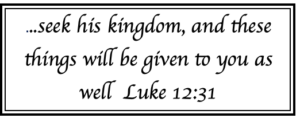G. R. Evans [in Alan of Lille (Cambridge, OUP,1983),pp.33—41. ] tells us that, “Augustine frequently discusses Scripture’s peculiar “usus loquendi” [manner of speaking]. [Augustine] sees such departures from the ordinary way of putting things … as a reflection of the power of the divine Word which breaks the bounds of ordinary grammar.” Take, for example, Luke 12:29: Don’t strive for what you should eat and what you should drink, and don’t be anxious.
 The anxiety here is the greek word meteorizesthe which, says Professor Lange, “echoes also in our [word] ‘Meteor.’” Meteors are known for their fiery entry into our atmosphere on their momentous fall to earth. Luke’s use of this term, to restate Augustine, “breaks the bounds of ordinary grammar” and sets forth in metaphor a profound truth. Lange explains,
The anxiety here is the greek word meteorizesthe which, says Professor Lange, “echoes also in our [word] ‘Meteor.’” Meteors are known for their fiery entry into our atmosphere on their momentous fall to earth. Luke’s use of this term, to restate Augustine, “breaks the bounds of ordinary grammar” and sets forth in metaphor a profound truth. Lange explains,  “Especially does the high flight of fancy appear to be meant, when one creates imagined necessities for himself, and for this reason is doubly ill-content with reality, and … allows himself so much the more to be seduced into unbelieving anxiety.”
“Especially does the high flight of fancy appear to be meant, when one creates imagined necessities for himself, and for this reason is doubly ill-content with reality, and … allows himself so much the more to be seduced into unbelieving anxiety.”
The Greek dictionary uses such words as “elevated with false hopes… unsettled…wild thinking, vain imagining..of doubtful mind” to describe this meteoric rise into the realm of foreboding desires. David called it in Psalm 131:1 an “exalted heart” and Obadiah 4 sees it as a desire to “soar.. among the stars”.
 Extracting the marrow of this truth: Jesus is talking about an anxiety built upon imagined necessities—or if the needs are real, imagining our Lord somehow negligent in meeting them—making such a christian doubly ill-content with his or her reality. …and living with longings that faith should be able to meet, emotional waves which faith is well able to calm. Jesus labeled this an example of little faith. [In the biblical language this is one word never used before. Did Jesus invent it? [oligopistoi Luke 12:28]
Extracting the marrow of this truth: Jesus is talking about an anxiety built upon imagined necessities—or if the needs are real, imagining our Lord somehow negligent in meeting them—making such a christian doubly ill-content with his or her reality. …and living with longings that faith should be able to meet, emotional waves which faith is well able to calm. Jesus labeled this an example of little faith. [In the biblical language this is one word never used before. Did Jesus invent it? [oligopistoi Luke 12:28]
In translating this text we cannot be sure if Luke was recording only the anxious anticipation of hunger, that God might not give us tomorrow our daily bread …like He has all along. Somehow empty coffers unnerve even believers. Or have we gone higher in our anticipation? In the interest in having something which represents a frivolous desire,  something someone else has, or, perhaps, something we rationalize we are entitled to have, we are overwrought with a most unreasonable quest for things. Instead of calming this maverick passion or lust through a time of prayer we entertain a growing anxiety—not over what God promises, because He, all along, has proven Himself faithful. We are not at peace within because we have our eyes on circumstances that might deny us “things,” things that have no eternal value and are, therefore, of lesser concern to God once our basic needs are indeed met by Him. Earthly interests are meteors burning up in the atmosphere of a hot passion for the “higher” life. Are they not!?
something someone else has, or, perhaps, something we rationalize we are entitled to have, we are overwrought with a most unreasonable quest for things. Instead of calming this maverick passion or lust through a time of prayer we entertain a growing anxiety—not over what God promises, because He, all along, has proven Himself faithful. We are not at peace within because we have our eyes on circumstances that might deny us “things,” things that have no eternal value and are, therefore, of lesser concern to God once our basic needs are indeed met by Him. Earthly interests are meteors burning up in the atmosphere of a hot passion for the “higher” life. Are they not!?
Luke 12: 30-32, 34 “…Your Father knows,” Jesus reassured, “that you need [the basics: food, clothes, etc.]. “But seek his kingdom, and these things will be provided for you. Don’t be afraid, little flock, because your Father delights to give you the kingdom. …
 Then in verse 33 Jesus seemed to go too far: Sell your possessions and give to the poor.
Then in verse 33 Jesus seemed to go too far: Sell your possessions and give to the poor.
But think about it. If we are less attached to our “things,” if we are “poor in spirit” [Matthew 5:3], we will see more clearly by faith that God has indeed provided all we ever really needed. And then there’s this [the rest of this verse and the next]:
“Provide purses for yourselves that will not wear out, a treasure in heaven that will never fail, where no thief comes near and no moth destroys. For where your treasure is, there your heart will be also.”


